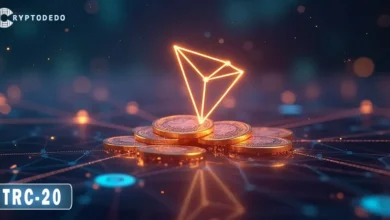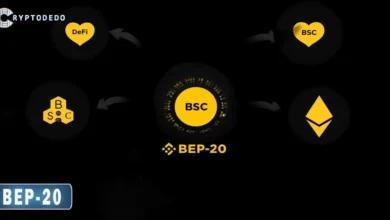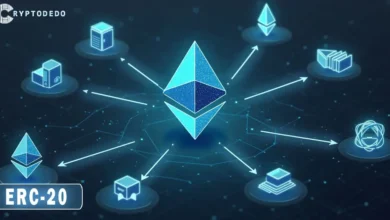Smart Contracts: Powering the Future of Crypto
Smart Contracts Explained: A Beginner's Guide

Smart Contracts and Crypto: A Seamless Integration
In the rapidly evolving world of cryptocurrency and blockchain technology, smart contracts are often mentioned as a key feature. Whether you’re learning about digital currencies, decentralized finance (DeFi), or blockchain applications, understanding smart contracts is crucial. But what exactly are they, and why do they matter?
At first, the concept might seem complicated, but it can be simplified. Essentially, smart contracts are just like traditional contracts but are entirely digital and self-operating. They work automatically, eliminating the need for middlemen (like lawyers or banks) by enforcing agreements based on pre-defined rules.
To visualize this, think of a vending machine. You insert a coin, pick your snack, and the machine delivers it automatically. No human intervention is required. A smart contract operates in a similar way: once the conditions set in its code are met, it executes the transaction automatically.
What is a Smart Contract?
A smart contract is a self-executing contract where the terms of the agreement are written directly into code. It operates on a blockchain, which is a decentralized digital ledger. When specific conditions are met, the contract automatically enforces the terms and completes the agreement.
In simple terms, think of it as a digital “if-then” statement:
If I send 1 Bitcoin to my friend, then the smart contract will automatically transfer a product or service to me.
No need for any human involvement once the conditions are satisfied—the contract runs on its own.
How Do Smart Contracts Work?
Smart contracts are written in code and deployed on blockchain networks, with Ethereum being the most commonly used blockchain for this purpose. The terms and conditions of the contract are programmed into the code, and once the contract is created, it runs autonomously on the blockchain.
The contract follows a clear “if-then” logic. For example:
If I send 1 Bitcoin to a seller, then the smart contract will automatically trigger the transfer of the product to me.
If the payment is not made, the product is not sent.
This entire process is automated and doesn’t require a third party (like a lawyer or bank) to ensure that the contract is fulfilled, which reduces costs and speeds up the transaction.
Smart Contracts and Blockchain
Smart contracts are hosted on blockchain networks. A blockchain is essentially a decentralized database that records all transactions in a transparent and tamper-proof way. When a smart contract is deployed on a blockchain, it becomes part of a permanent, unchangeable record.
For example:
If you create a smart contract to sell an item, the contract is added to the blockchain.
Once the buyer meets the agreed conditions (like sending payment), the contract automatically triggers the fulfillment of the agreement—whether it’s transferring ownership or delivering a product.
This decentralized nature ensures that no single party controls the contract, and the terms of the contract cannot be changed or altered once it’s live.
Trust Without Trust
One of the most appealing features of smart contracts is that they allow parties to do business without having to trust each other. Instead, the trust is placed in the blockchain and the contract’s code. As long as the conditions are met, the smart contract will execute exactly as programmed.
In traditional contracts, you rely on intermediaries such as lawyers, banks, or notaries to ensure that both parties uphold their side of the deal. With smart contracts, enforcement is built into the technology itself. This reduces the risk of fraud, manipulation, or delays in the process.
Example of Blockchain Automation in Action
Let’s look at a real-world example:
You want to buy an NFT (Non-Fungible Token) from a seller.
The smart contract is programmed with a simple condition: If the buyer sends 1 Ethereum (ETH) to the contract, then transfer the ownership of the NFT to the buyer.
Once you send 1 ETH, the contract verifies the transaction on the blockchain. If the payment is confirmed, the ownership of the NFT is automatically transferred to you, and the seller receives the payment. The whole process is transparent, traceable, and irreversible, meaning no one can tamper with the transaction.
Benefits of Decentralized Digital Contracts
Smart contracts offer several advantages over traditional contracts, including:
Security: Blockchain’s encryption ensures that the contract’s data and terms are tamper-proof.
No Middlemen: By removing intermediaries like banks or legal entities, smart contracts reduce costs and delays.
Automation: Smart contracts execute automatically as soon as the conditions are met, which speeds up the process.
Cost-Efficiency: Without third-party fees, transactions can be much more affordable.
Common Uses of Blockchain-Based Contracts
Smart contracts are transforming many industries with their versatility. Some of their most popular applications include:
Financial Transactions: Cryptocurrencies like Bitcoin or Ethereum utilize these automated agreements to manage payments, loans, and even investments.
Real Estate: Smart contracts can automate the transfer of property ownership once a payment is made, eliminating the need for lengthy paperwork and escrow services.
Supply Chain: Businesses use these blockchain-based agreements to automate payments and shipments when certain milestones in the supply chain are met.
Insurance: Smart contracts can automatically process insurance claims based on pre-defined rules, such as paying out compensation when a flight is delayed.
Use of Smart Contracts in Centralized and Decentralized Exchanges
1. Centralized Exchanges (CEXs):
In top crypto exchanges, the use of blockchain-based agreements is limited, as these platforms are governed by a central authority. However, some centralized platforms do incorporate these digital contracts in specific areas:
Escrow Services: Some exchanges may use automated agreements to act as escrow agents for certain transactions, ensuring funds are only released once conditions are fulfilled.
Token Issuance: When platforms like Binance issue their tokens, they often rely on coded contracts to automate the process of token creation, staking, or burning.
Despite these cases, most centralized exchanges rely on traditional systems for managing operations and user funds.
2. Decentralized Exchanges (DEXs):
Automated agreements form the backbone of decentralized exchanges, enabling them to function without a central authority. Key applications include:
Automated Trading: These blockchain-based programs match buyers and sellers, automatically executing trades once predefined conditions are met, eliminating intermediaries.
Liquidity Pools: Users deposit tokens into decentralized pools, managed by self-executing agreements, which automatically distribute rewards based on contributions.
Token Swaps: Automated mechanisms enable users to swap tokens directly from their wallets, ensuring both parties in a transaction receive the correct assets.
Staking and Yield Farming: Participants lock their assets in these contract-based pools to earn rewards, with all processes handled automatically by the platform.
Governance: Some DEXs allow token holders to vote on platform changes via these decentralized protocols, ensuring transparent and fair decision-making.
Risks of Smart Contracts
While blockchain-based contracts offer significant advantages, they come with some risks:
Code Vulnerabilities: These contracts are essentially software, and any bugs or errors in the code can lead to unintended outcomes, such as the loss of funds.
No Legal Recourse: If something goes wrong with an automated contract, there’s often no way to reverse the transaction or resolve disputes.
Complexity: Creating and auditing these contracts requires specialized knowledge, and mistakes in the code could lead to serious problems.
Dependence on Oracles: Sometimes, external data (oracles) are necessary for the contract to function. If this data is incorrect or manipulated, the contract could misbehave.
Conclusion
Blockchain-based contracts are an innovative and powerful tool in the world of blockchain. They offer increased security, speed, and cost-efficiency by automating agreements without the need for intermediaries. However, like any emerging technology, they are not without risks, particularly related to coding errors and the lack of legal recourse.
As blockchain technology continues to evolve, these automated agreements will likely play an even more significant role in industries from finance to real estate, bringing greater transparency and automation to the way we do business.




